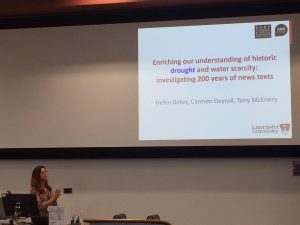Carmen Dayrell from the ESRC Centre for Corpus Approaches to Social Science (CASS), Lancaster University, has presented her work with Helen Baker and Tony McEnery on a diachronic analysis of newspaper articles about drought and water scarcity at the 9th International Corpus Linguistics conference (CL2017). Corpus linguistics is a methodology for the systematic analysis of large amounts of empirical data to study language. The CL2017 was hosted by the University of Birmingham, from 24-28 July 2017.

Entitled ‘Enriching our understanding of historic drought and water scarcity: investigating 200 years of news texts’, the paper discussed the media representation of drought and water scarcity throughout the United Kingdom, covering two hundred years of newspaper data, from 1800 to 2014.
The results showed that, throughout the entire period, drought events were portrayed as intense and prolonged, with negative impacts of across the country, especially England. But the analysis also unveils some interesting shifts in the discourse. While references to drought the 19th and most of the 20th centuries overwhelmingly related to lack of rain, the word drought started to be used increasingly more frequent as a metaphor towards the end of the 20th century. These mainly related to sporting achievements (e.g. goal, trophy or scoring droughts) and finance (credit, mortgage droughts).
Another clear shift relates to people’s concerns. In the 19th century, the newspapers frequently mentioned the impact of droughts on farming and agriculture. From the 1990s onwards, the focus seems to have shifted to constraints and limitations in people’s daily lives due to shortage or rationing of water, which in turn led to the introduction of hosepipe bans or the use of standpipes. Concern over the impact of droughts on plants and gardens has become one of the major topic in the contemporary broadsheet papers and tabloids.
